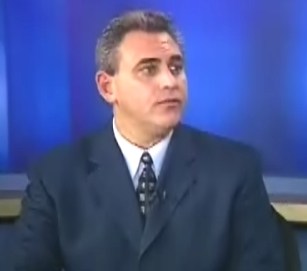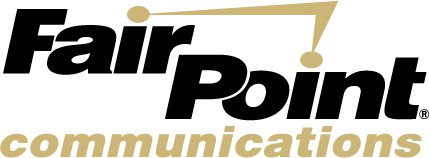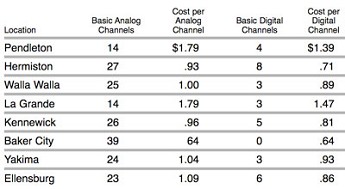
Bray Cary, Host of Decision Makers
A network of West Virginia television stations spent 20 minutes this past Sunday airing a puff piece that could have been a video press release straight out of Frontier’s public relations department. Decision Makers, a self-described “agenda setting” public affairs program ostensibly puts important people on the “hot seat” to answer “tough questions about where West Virginia is heading and how it will get there.”
Hardball this was not. Host Bray Cary, who also happens to serve as president and CEO of the television station group, presided over a one-sided softball tournament for Ken Arndt, Frontier’s new Southeast region chief in a 20 minute interview where the hardest question was likely posed off camera – ‘where would you like to do lunch?’
Decision Makers is seen across West Virginia on Cary’s statewide network of television stations — WOWK in Charleston-Huntington, WBOY in Clarksburg-Morgantown, WTRF in Wheeling and WVNS in Beckley-Bluefield.
The appearance of Arndt on the program comes the same week Frontier reportedly committed to purchasing significant advertising time on the stations, leading a Stop the Cap! reader who informed us about the program to ponder whether this Fluff-Fest was part of the ad deal.
Viewers on the public comment section for the show were unimpressed.
“I can’t believe Mr. Cary didn’t ask the Frontier guy any hard questions. It was like a 20 minute commercial for Frontier, is that what you get for buying advertising with the station,” asked one. “I believe that we would all like to hear and understand Frontier’s direct response to challenging questions from an involved, and knowledgeable speaker. We need to hear more then a branding speech,” said another.
The interview was loaded with misleading and occasionally false statements, often coming from the program host, who served as presiding cheerleader. You can watch the program’s two segments, and then take a look at our reality check (and if an all-consumer volunteer website can manage this, why can’t Mr. Cary?)
[Video No Longer Available]
Now that you’ve watched, let’s review the misleading statements, some made by Arndt, some by the host:
“You guys are serving 35% of West Virginia – that’s a third of the phones.”
Frontier may serve 35% of the landmass of West Virginia, but not 35% of the population, which is a very important distinction. Verizon has the overwhelming majority of customers in the state, not the tw0-thirds this statement suggests.
“I guess the only guys fighting you all right now are the Communications Workers of America union workers.”

Ken Arndt - Frontier Communications
That, along with other dismissive comments made by Cary represent just how biased his interview was. In many communities, citizens, businesses, utility commission staff, and yes – company workers are fighting this deal, because it’s bad news for every community facing a Frontier takeover. Of course, Cary doesn’t have anyone on his program to refute his guest (or him for that matter.)
“From a timelime perspective, and we’re actually finishing our [broadband expansion] engineering plan right now — by December 15th, my expectation is within the first 18 months we will make a substantial increase raising that 60% (of Verizon broadband penetration) exponentially and making a large investment and bringing in the individuals — the engineering and construction talent to be able to get it done as quickly as possible.”
Frontier anticipates cutting $500 million in costs per year if the deal consummates, according to Bloomberg News. Job cuts at both Frontier and Verizon will create some of that savings, according to Maggie Wilderotter, Frontier’s CEO. Customer service and field-technician jobs won’t be eliminated, she claims, but with a need for that level of cost savings, combined with the enormous debt Frontier will assume, where the resources to accomplish this expansion will come from is not explained.
Frontier’s broadband expansion targets so-called “middle-mile” expansion. That was precisely what was done in Rochester. Fiber optics are used to connect various central offices and some remote network extenders (known as DSLAMs) to try and extend DSL service into more distant areas further away from the central office. DSL speed is highly dependent on distance. The further away you get, the lower the speed you can obtain. Frontier plans to install limited amounts of fiber linking their offices in hopes of providing DSL service in areas that do not have access to it currently. Unfortunately, every indication is that Frontier’s DSL in most parts of West Virginia will provide a maximum of 3Mbps, if you’re lucky. In communities like Rochester, DSL service is marketed at 10Mbps, but as I’ve experienced myself, that speed really turned out to be 3.1Mbps living less than one-half mile from the city line.
To many consumers, hearing talk about fiber optics may leave the impression they’ll have this type of connection in their home or business. That’s highly unlikely. Frontier fiber serves their own internal network. Verizon FiOS serves you directly on a fiber optic cable.
‘In West Virginia in 2007 Frontier lost 2.7% of our access lines. In Verizon’s footprint they lost 6.7%. In 2008, Frontier’s lost just 2% while Verizon increased [their loss] to over 8%. Frontier has put together unique packages that continually add value to landlines. It’s through [Frontier’s] packaging, providing unique services and unique technologies [that the company limits losses].’
Frontier is in the enviable position of focusing on rural markets long bypassed by the phone company’s biggest threats: cable and wireless competition. Verizon is not. The real reason for the dramatic difference in line loss is that Frontier customers often have no other choices for telecommunications services. In West Virginia, cable does not serve many rural communities, so there is no “digital phone” competition to worry about. Mobile phones in the most mountainous regions of the state can offer problematic service if it’s the only phone you have. Verizon, which does face relentless cable television competition, pays the price in greater line loss. Rural West Virginia has a much higher population of elderly residents, who are usually the least likely to drop traditional phone service. In fact, no state has a higher population of the rural elderly except Florida.
These factors afford Frontier more protection from line loss, not the so-called “unique services and unique technologies” the company only speaks about generally.
Arndt also responds to a question about Frontier’s plans for fiber and other forms of “telco-TV” such as that provided by Verizon FiOS. After noting the company does plan to move forward on an extremely limited basis by finishing FiOS projects already under construction, Arndt signals Frontier believes its status as a simple reseller of DISH satellite service somehow provides a superior solution to telephone company provided television.
Not really.
Who needs Frontier to sign up for DISH? Customers can sign up directly themselves. The advantage of “telco TV” really comes from the construction of the network to support it. Both AT&T and Verizon have built television-ready networks which not only compete with cable, but also give their customers more and better broadband choices that Frontier cannot and will not offer consumers. Frontier tries to valiantly spin its copper cable future by saying satellite television offers a better service, but in reality, being a DISH Network reseller hardly is in the same class as FiOS or U-verse.
Residents in the affected areas need to consider whether they are tying themselves to a company that believes copper wire slow speed DSL is good enough for now and into the indefinite future, has no plans to directly compete with cable and other providers in delivering a wired telephone company cable service, will not build FiOS-like fiber optic networks in areas that one day could have been wired by Verizon, and will live with a company content with delivering “ubiquity” of service across all of its service areas, which in reality means large communities will suffer with lowest common denominator service, and rural communities will be lucky to get “good enough for you” broadband.
Arndt’s comments about fiber connectivity in selected portions of their service area refer mostly to multi-dwelling units and new housing developments where service was provided more cost effectively through a shared fiber connection. That’s not FiOS either.
Color us unexcited about the prospect of Frontier’s ‘unique cable television via broadband service’ Arndt hints at. That is almost certainly the new DISH set top box that can connect to your Frontier DSL service to stream on-demand television shows. With Frontier’s 5GB Acceptable Use Policy for broadband, don’t expect to watch too much if and when they enforce the limit.
 Among the most shameful segments of the 20 minute video press release Cary presides over is in the second half, when he asks and answers his own questions, spun in Frontier’s direction, about their ability to digest Verizon’s operations that dramatically dwarf Frontier’s current size and scope. He’s even done “his research,” which suspiciously appears to be surfing through Frontier’s own talking points from their website and public relations efforts. As far as Cary is concerned, Wall Street says they “like” the deal, and opposition to it is “a lot of noise.”
Among the most shameful segments of the 20 minute video press release Cary presides over is in the second half, when he asks and answers his own questions, spun in Frontier’s direction, about their ability to digest Verizon’s operations that dramatically dwarf Frontier’s current size and scope. He’s even done “his research,” which suspiciously appears to be surfing through Frontier’s own talking points from their website and public relations efforts. As far as Cary is concerned, Wall Street says they “like” the deal, and opposition to it is “a lot of noise.”
Arndt responds that the opposition to the deal comes because of FairPoint Communications, which he says failed because of the complexities of integrating their billing systems. As Stop the Cap! readers already know, FairPoint’s troubles went well beyond computer integration problems. Arndt’s reasoning is akin to saying New Orleans drowned in Hurricane Katrina because a storm sewer up the street was clogged. More than 20 news reports on this site alone document the entire sordid story. On every level, FairPoint failed New England for a range of reasons:
- The enormous debt FairPoint was saddled with made it difficult for the company to spend the money necessary to maintain and grow their network and survive an economic downturn. Frontier will also take on enormous debt during a challenging economy and claims it will spend millions to expand broadband service into rural areas where fewer potential customers mean a longer Return On Investment;
- FairPoint’s acquisition of Verizon New England involved more customers than FairPoint served nationwide before the buyout. The exact same thing is true of Frontier in this deal;
- FairPoint’s earlier acquisitions were small, independent phone companies run with limited bureaucracy. Verizon, and its predecessor Bell System businesses, have done things their own way for decades, making theoretical transitions doable on paper and chaotic in reality. The exact same scenario exists with Frontier’s purchase of Verizon service areas;
- Poor service, unresponsive and overwhelmed customer service centers, insufficient investment, and broken promises plagued FairPoint’s New England adventure from day one. Frontier risks repeating FairPoint’s mistakes, putting customers with no other options for telecommunications service at serious risk.
Cary doesn’t have the insight or the interest in digging down into Arndt’s claims. Maybe he forgot. As far as Cary is concerned, everyone in West Virginia should just get familiar with the Frontier name.
Of course, actual consumers aren’t invited on Decision Makers. Nor are any groups opposed to the deal. But West Virginians and others can be “decision makers” and choose a different path for their telecommunications future. They can get on the phone and call their state representatives and tell them to oppose the deal. They can also contact the state utility commission and file their own comments telling them this deal isn’t worth the risk — three bankruptcies out of three earlier deals.
Even when playing this kind of softball, three strikes should mean you are out.




 Subscribe
Subscribe








